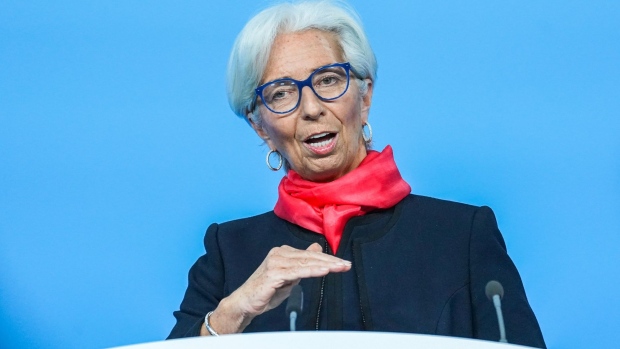Jun 16, 2022
Lagarde Tells Ministers ECB Plans for Limit on Bond Spreads
, Bloomberg News

(Bloomberg) -- European Central Bank President Christine Lagarde told euro-area finance ministers that the ECB’s new anti-crisis tool will kick in if the borrowing costs for weaker nation rise too far or too fast, according to people briefed on their discussions.
At a meeting in Luxembourg Thursday, Lagarde explained to ministers that the new mechanism that central bank officials are devising is intended to prevent irrational market movements from putting pressure on individual euro nations as ECB embarks on its first interest-rate hikes in more than a decade, the people said, asking not to be identified discussing private conversations.
The euro rose 1.2% to $1.0580, its highest level of the session, on the news.
She said the instrument may be triggered if bond spreads widen beyond certain thresholds or if market movements exceed a certain speed. Lagarde did not specify whether those limits would be made public.
The ECB Governing Council on Wednesday instructed officials to accelerate work on a “new anti-fragmentation instrument” after the yield on Italian bonds surged amid signs that global inflation is becoming more entrenched.
Lagarde last week set out the ECB’s plans for a 25 basis-point increase in rates next month, the bank’s first hike since 2011, and signaled that a larger move is likely at its next meeting in September.
Read More: Bridgewater Builds $5.7 Billion Bet Against European Stocks
An ECB official said that the central bank has to address the fragmentation issue to ensure that monetary policy is effectively transmitted across the whole euro area and investors should not doubt the commitment of policy makers to deliver on their mandate to maintain price stability.
Central banks around the world are battling to show they can tame rampant inflation after arguing for months that price surges were temporary.
In Europe, the prospect of the ECB increasing rates for the first time since the sovereign debt crisis in the early part of the last decade is stirring up concerns that the flaws in the currency bloc might again be exposed. The limited mechanisms for fiscal transfers between member states and the incomplete banking union mean that weaker countries can come under pressure in periods of financial turbulence.
(Updates with markets in second paragraph)
©2022 Bloomberg L.P.






